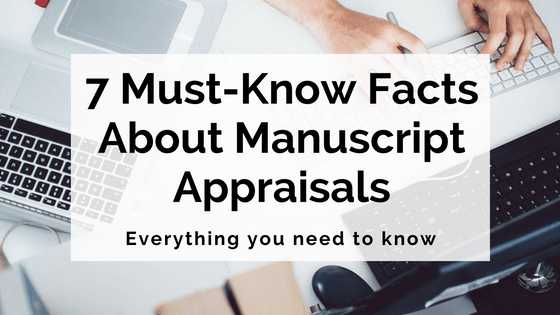A manuscript appraisal provides a crucial buffer before submission, and enables not only the development of your manuscript but the development of yourself as a writer, helping you on your way as you work towards publication. But how can you tell if this service is right for you and your novel?
In this article, we’ll provide in-depth answers to some common questions about manuscript appraisals to help you get a better idea of the service.

We’ve also provided a writer’s (that’s me) first hand experiences paying for an appraisal of her (my) own manuscript.
So if you’re unsure about paying for a manuscript appraisal, read on and let us help you figure it out.
1. What is a manuscript appraisal?
A manuscript appraisal, or manuscript assessment, is a paid service that assesses a piece of creative work, either in part or in full (depending on your budget and needs), and provides feedback.
A manuscript appraisal is an entirely commercial experience that gives a writer a fresh, objective outsider’s perspective on their manuscript, a highly valuable resource when writing a novel.
Manuscript appraisal focuses on structural strengths and weaknesses:
Line editing (rewording those clunky sentences) and proofreading (catching that missed apostrophe) are entirely different beasts. These should be handled separately and well after structural edits have been actioned.
To clarify, an appraisal does not guarantee publication.
An appraisal is not an industry standard. Publishers do not care if a manuscript is appraised before submitting. A literary agent may recommend one, but it is by no means a prerequisite.

2. How do I know if I need an appraisal?
An appraisal is not for every writer. If you don’t take critiques well, then perhaps you shouldn’t pay for one because appraisals are not cheap.
However, the ability to take on criticism, advice and opinions without suffering a mental break is an important part of a successful writer’s life. Self-improvement and skill development is crucial, and an appraisal might be a good, albeit abrupt, way to introduce yourself to the idea of working with an editor.
An appraisal works best for those who:
- Live in a regional or rural area without access to a local writers’ group.
- Are intimidated by the prospect of exposing your work to a large group of people (said writers’ group).
- Want quick and guaranteed feedback (within two months).
- Want detailed, genre-specific feedback.
- Don’t want it sugar-coated and take critiques well.
- Have clear goals for the manuscript.
- Are too close to the work to differentiate between good and bad.
If you can relate to any or all of these, it could be worth seriously considering a professional appraisal.
3. What needs to be considered before seeking a manuscript appraisal?
A lot of people want to be writers, and as a result, manuscript appraisal is a booming industry.
Type ‘manuscript appraisal’ or ‘manuscript assessment’ into Google and expect a mini-migraine. The internet is, as usual, option overload.
But before you click-on, consider the following:
What is your budget?
Budget is always the definitive question. Before you do anything else, figure out your budget. An appraisal is not a thrifty affair. Manuscript appraisals are priced by word count and can cost from $150 to well over $1000.
A lot of manuscript appraisal companies also provide add-ons such as mentoring programs, follow up phone calls and even face-to-face meetings (each minute counted) with your appraiser. Then you add the admin costs.
For example, I submitted a 70,000-word manuscript for appraisal and was quoted just under $700. An additional $60 was added on top of this for the company to print out my manuscript as I’d chosen to email it through.
That means the whole show cost me nearly $800. That may not seem like a lot in the long game, but for an emerging author who has yet to be paid for publication, that’s a lot of dollars.
Remember: appraise within your means.
Can you get mean and ‘kill your darlings’? If you can’t bring yourself to trim the fat, then be warned – those extra words will make your wallet lighter.
Don’t have the funds right away? Then do like you did when you were a Dollarmite and save, save, save.
What kind of feedback are you looking for?
Clarify what you want from this experience.
Are there specific areas you’re concerned about in your manuscript? Is the voice bugging you? Does the protagonist’s wonky gait seem a bit, well, wonky? Are you after an appraiser with specific genre knowledge?
Consider your goals for your manuscript. What are you working towards in style, tone, characters, pace?
Know your direction so you can find the right appraiser for your work.
Do you have to appraise the entire manuscript?
As mentioned in the budget section, appraisals are costed on word count. Do you have to get your entire manuscript appraised? Have you even written an entire manuscript to begin with?
Maybe you’ve written the first three chapters of something and you want to know if it’s worth any more of your time.
Maybe your whole novel rests on the strength of your opening scenes.
Maybe you’ve got a wallet as bare as the Simpson Desert and can’t afford anything more than the first ten thousand words.
Whatever the reason, the option is there: partial manuscript appraisal. Almost all companies provide this service and prices start around $180 for the first 20 pages , (this particular example includes a 90- minute follow- up conversation with your appraiser).
So ask yourself: do you really need the whole show or can you get by on just the teaser?

Do you want a follow-up or a once-off assessment?
As mentioned in the budget section, appraisers often offer add-ons in the form of follow up conversations and/or mentoring packages. This usually costs extra, though some companies offer it as part of the package (such as the partial appraisal example mentioned above).
Consider if you are happy with just detailed written feedback. Personally, this was more than sufficient for my needs: a Word document with numbered examples, sub-headings and a clearly articulated opinion.
I found the concept of a conversation sloppy.
And I don’t know about you, but I’m much more coherent on paper. Conversations bamboozle me. I forget to ask stuff. Important points are lost in the buzz of creative chatter.
However, if a Word document is too impersonal, there are appraisers who provide the option of live discussion, whether in person or on the phone, which can greatly boost what you gain from your appraisal.
If you are going ahead with a follow- up conversation, make sure to bring a list of questions and take notes while you talk. If you’re not big on handwriting, record the meeting on your phone to replay later at your leisure.
4. How do I know when my novel is ready for appraisal?
Do not submit your manuscript too early. By too early, I mean too raw, rough, ragged around the edges. The first draft is a no. Second and third are a no. Four, five and six are out as well.
If you get an appraisal too soon, the entirety of the feedback is going to be focused on messy paragraphs and obvious plot holes. Your appraiser will be stuck on the stuff you could have sorted out on your own.
Get your manuscript to a workable standard before you submit so the appraiser can focus on the big picture stuff such as character development, narrative arcs, setting and voice, and doesn’t get bogged down in the basics.
Don’t waste your opportunity and money on revelations as bland as that your dialogue is punctuated incorrectly, or that your protagonist has an accent for three chapters then drops it for the next six.
Don’t be lazy.
Maximise your chance at gaining quality and useful feedback on your novel. If you’re not sure if you’re for an appraisal yet, here are a few ways you can tell:
- You can see no apparent issues with narrative or logic in your manuscript (i.e. timeline makes sense, settings are solid, world rules are consistent and not contradictory).
- Spelling, grammar and punctuation errors are minimal if not non-existent.
- Formatting is consistent and of an industry standard (i.e. double-spaced, size 12 Times New Roman font, etc.).
- Characters are consistent and seem credible.
- You’ve performed multiple re-drafts and reviews.
- You believe your manuscript is in the best possible state you can achieve without external help.
- You can no longer differentiate between good and bad, having done so many drafts you’ve lost the ability to effectively self-edit.

5. How do I go about choosing an appraisal service?
As a first-timer, it is easy to get overwhelmed by the options available. As the Australian Society of Authors warns, when considering the ‘commercial undertaking’ of an appraiser ‘due diligence must always be exercised’. Here’s a few things you should be looking for:
- The company should be based in your home country to ensure ease of transactions, follow ups and a fluent use of your language. Keeping it local (nationally) means no time zone issues (or minimal) or translation hiccups.
- Some companies provide a post-appraisal publication list (you may need to request one) – this is a list of manuscripts that have gone on to be published after their appraisal.
- The company should be registered as a legitimate business with your county’s business register/taxation office.
- The company should ideally be recognised by your country’s official society of authors and/or editors.
- The company’s pricing should be competitive (you may need to request a quote).
- The company’s turnaround time should be competitive (i.e. six to eight weeks for a full manuscript).
In addition to this, any reviews or testimonials of previous appraisals are great ways to get a feel for the company and quality of services provided.
If Google and Bing are doing your head in, your country’s author/editor associations should keep a comprehensive list of registered manuscript appraisal services. For example, Australian authors can consult the Australian Society of Authors list here.
Alternatively, writers’ centres or groups often supply appraisal services to members and non-members for a reasonable fee. In Australia, these services are provided by the state writers’ centres.

6. What should I include when sending my manuscript off for appraisal?
Making contact is a simple as visiting a website, clicking ‘Contact Us’ or sending an email. The company should take it from there, prompting you for manuscript specifics such as genre, style and any special requests.
For example, the appraiser to whom I submitted my aforementioned 70,000-word manuscript prompted me for the following:
- The manuscript formatted to current Australian industry standards.
- The cover letter used when submitting to publishers.
- A letter to the appraiser explaining the goals for the manuscript, both in narrative and in the marketplace, and what was wanted from the appraising experience, i.e. what areas was of particular concern (such as credibility of characters, setting, etc.).
- A single page synopsis used when submitting to publishers.
The appraiser also clarified the genre and intended audience so as to match the manuscript with the best appraiser.
If a company does not prompt for this information, don’t be afraid to speak up. Send a list of your main concerns along with your manuscript. Tell the appraiser what you were attempting to achieve. Ask after genre-specific assessments.
Don’t be shy. Remember: an appraiser doesn’t know you or your novel. The more information they have before they begin, the better their appraisal can be.

7. What sort of feedback can I expect to receive from my appraisal?
What seemed like a great idea initially may not be so shiny once you receive the appraisal.
Listen, the appraiser didn’t set out to ruin your day. Week. Month. The appraiser set out to spot problems and suggest solutions. To help you turn your manuscript into a bona fide sellable novel.
Now it’s all on you.
As with any critique, take what you like and leave what you don’t. That being said, if you intend on disregarding the entire appraisal then perhaps you should reconsider your choice – and your dedication to improving your novel!
My own 70,000-word manuscript was returned with 31 pages of appraisal which included:
- A five-page summary of readability, narrative, characterisation, dialogue, voice, presentation, things to watch, and the synopsis.
- A breakdown of each chapter evaluating what worked and what didn’t (as specific as page and paragraph numbers), paying special attention to the concerns I mentioned in the letter to the appraiser.
- A final word from the appraiser on the marketability and potential success of my manuscript.
The appraisal surpassed my expectations in quality and detail. Issues were legitimate and painfully obvious once pointed out. Almost all suggestions were actioned and the manuscript is undoubtedly better for it.
***
In an ideal creative environment, writers would cluster together and always be on hand to offer helpful feedback, brainstorm narrative solutions and chant your name as you worked out the kinks in that final fight scene.
If you have access to a network of excitable wordsmiths, then save your money. An appraisal isn’t for everyone. But for those of you missing out on this creative network, an appraisal could be just what you need to push your manuscript to the next level.
2 responses to “7 Must-Know Facts About Manuscript Appraisals”
Very helpful. I’m just starting out and it’s cool to know there are some people out there who dedicate time to giving such helpful tips.
Veery helpful and practical advice. Thanks